Woody Would Be Fixed Again in
The dark side of Toy Story
(Image credit:
AF archive / Alamy Stock Photo
)
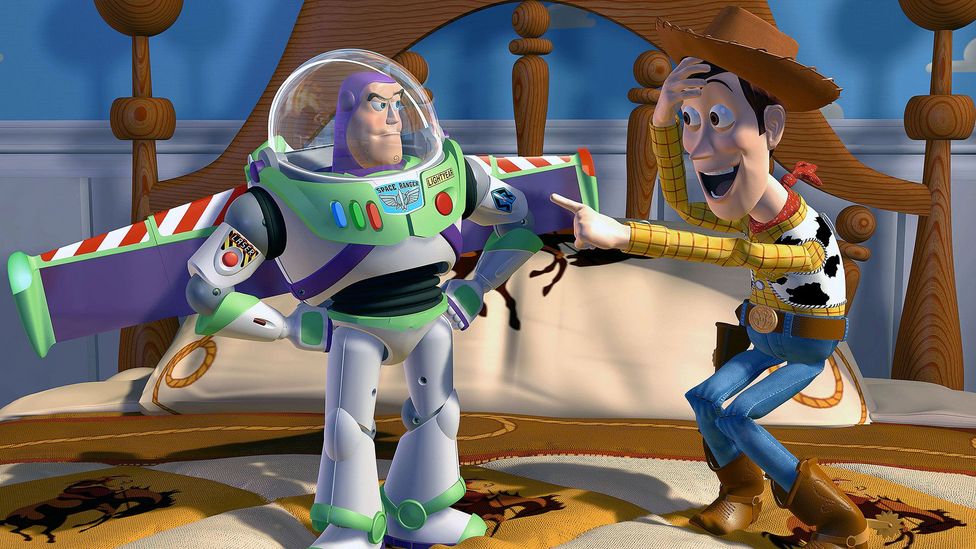
As Pixar's classic animation turns twenty, Nicholas Barber finds out what made the tale of Woody and Buzz Lightyear so special.
I
It's a scene from the creepiest of Philip One thousand Dick-inspired science-fiction thrillers. Stranded in a hostile environment, a man discovers that everything he knows about the world is a lie. All of his memories are fake, all of his convictions wrong. He isn't the hero he assumed he was. He isn't even an private. He is an automaton, manufactured from metal and plastic, his simply purpose to amuse his creators. No wonder Buzz Lightyear gets then depressed.
Information technology'south exactly xx years since audiences first saw that scene in Toy Story, Pixar'due south debut characteristic-length cartoon. Heralded as a groundbreaking triumph in 1995, the film is now enshrined equally a classic, and every other Hollywood studio has copied its innovations: its eerily realistic digital blitheness, its snappy screwball dialogue – co-written by Buffy/Avengers mastermind, Joss Whedon.
Simply the moving-picture show'due south virtually radical element, and the one which hasn't been imitated by any other studio, is its theme of disillusionment. As hilarious and heartwarming as Toy Story may be, its impressively downbeat thesis is that you lot're non special, you lot're the aforementioned as everyone else, and you won't be content unless you resign yourself to your unremarkable fate. That's quite something from a cartoon co-starring a talking Mr Murphy Head.
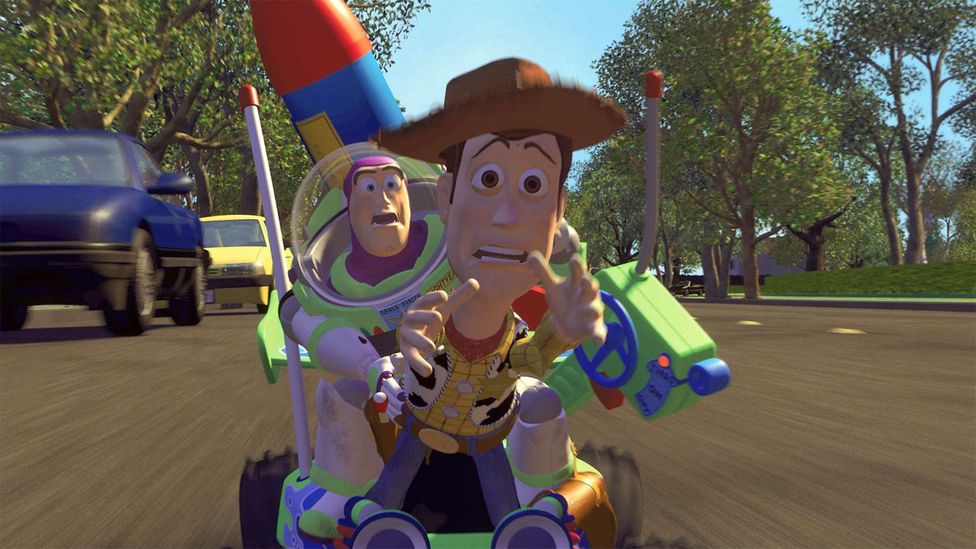
Toy Story is now considered a classic, and every other Hollywood studio has copied its innovations (Credit: Disney/Pixar)
Identity crisis
Just in case you haven't seen it, the premise of Toy Story is that our toys come live when we're not looking. Simply what they like best is to be played with by human beings. Buzz Lightyear (voiced by Tim Allen) is the exception. A Space Ranger action figure belonging to a male child named Andy, he believes that he really is an intergalactic superhero, only that doesn't cease him becoming Andy's favourite plaything, much to the badgerer of a cowboy toy, Woody (voiced past Tom Hanks).
Eventually, Woody comes to accept Buzz, and Buzz comes to accept his truthful identity. Information technology's a happy ending, sort of. But you accept to wonder ... given how cheerful Buzz was when he thought he was a Space Ranger, why should we be glad nearly the brief life of slavery that he'southward got to expect forward to?
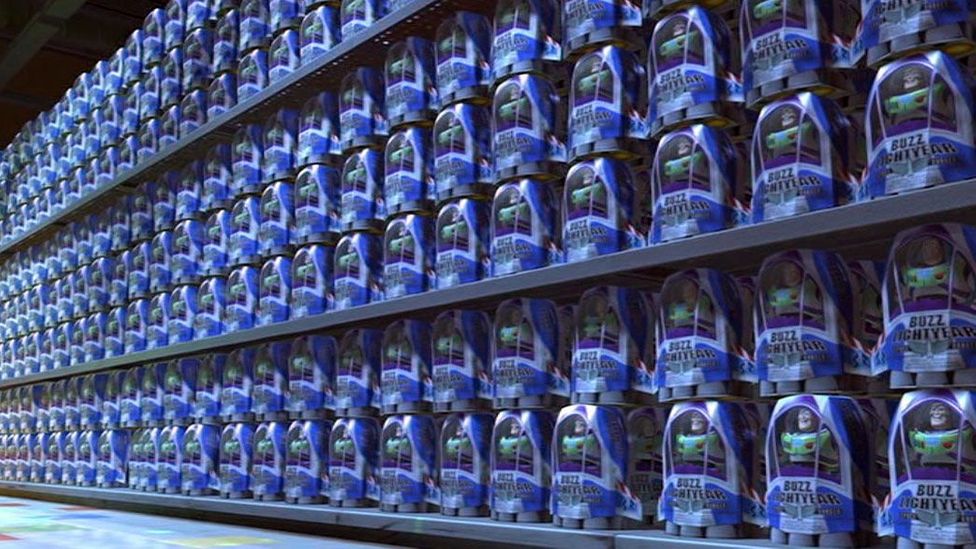
In i terrifying moment, Buzz catches a Goggle box advertisement for his ain toy range, and sees a Kubrickian shot of shelves stacked with his doppelgangers (Credit: Disney/Pixar)
Later on all, the sequence in which he realises that he is actually a mass-produced doll is horrifying in any number of ways. First, there is the affair of where it happens. When the penny drops, Buzz isn't in Andy's sunny family unit home, but in the house adjacent door, where the sadistic Sid is busy dismantling, melting, and otherwise mistreating every toy he can get his hands on. In the circumstances, Woody's claim that "bein' a toy is a lot meliorate than bein' a Space Ranger" tin't help but ring hollow.
2d, there is the sanity-snapping moment when Buzz catches a Tv advert for his very own toy range, and sees a Kubrickian shot of shelves stacked with his doppelgangers. Third, at that place is his understandably extreme reaction. Having drunkenly wailed almost the cruel catholic joke of his existence, Buzz tears a sticker off his arm – a self-mutilation which volition disturb anyone who has ever peeled off a plaster.
In 99 out of 100 movies, Buzz would so assert his independence. He would declare that it was upward to him whether he was a toy or not, and he would race off into the sunset, bellowing his battle cry, "To infinity and beyond!" But in Toy Story, that option is never mentioned. Buzz immediately puts all thoughts of saving the galaxy backside him, and gets on with returning to his master, Andy. If the message of about Hollywood entertainment is, "You can be annihilation you dream of beingness," the message of Toy Story is, "No, you lot tin can't."
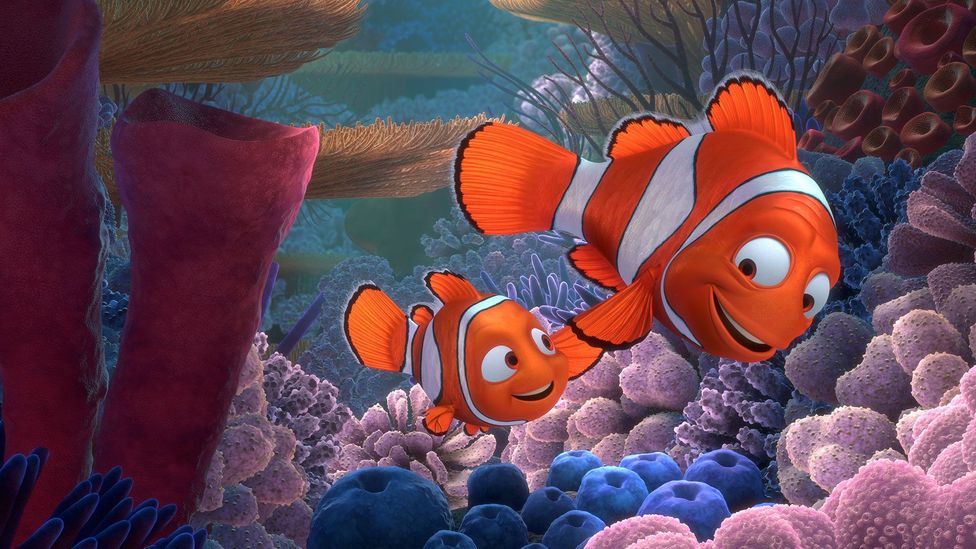
Finding Nemo is congenital on the anxieties of Nemo's male parent, a widower packing his son off to schoolhouse (Credit: Disney/Pixar)
'Falling with style'
Information technology'due south an amazingly mature message for a alive-activity film, allow alone an blithe one, only Toy Story prepare the Pixar trend for cartoons about adults, not children. In 1995, this was pioneering in itself. Fairy-tale princesses aside, the central characters in the about beloved Disney cartoons were and are pre-teens: Pinocchio, Dumbo, Bambi, Alice in Wonderland, Peter Pan, Mowgli in The Jungle Book, Simba in The Lion King (which came out the year before Toy Story).
There are adults in these films, besides, but the likes of Jiminy Cricket and Baloo the Behave are sidekicks and teachers; the protagonists are the youngsters they cherish. Toy Story upended that tradition. We barely see Andy, the owner of Buzz and the others, and when we do he looks like a monstrous giant conflicting. The master characters, the toys, are essentially his parents: harried adults who want nothing more than to please him, fifty-fifty while knowing that he will soon grow upwardly and get out them behind. The genius of John Lasseter, the director of Toy Story and the chief creative officer of Pixar, is to enchant millions of children with films nigh how difficult and unrewarding their mums' and dads' lives are.
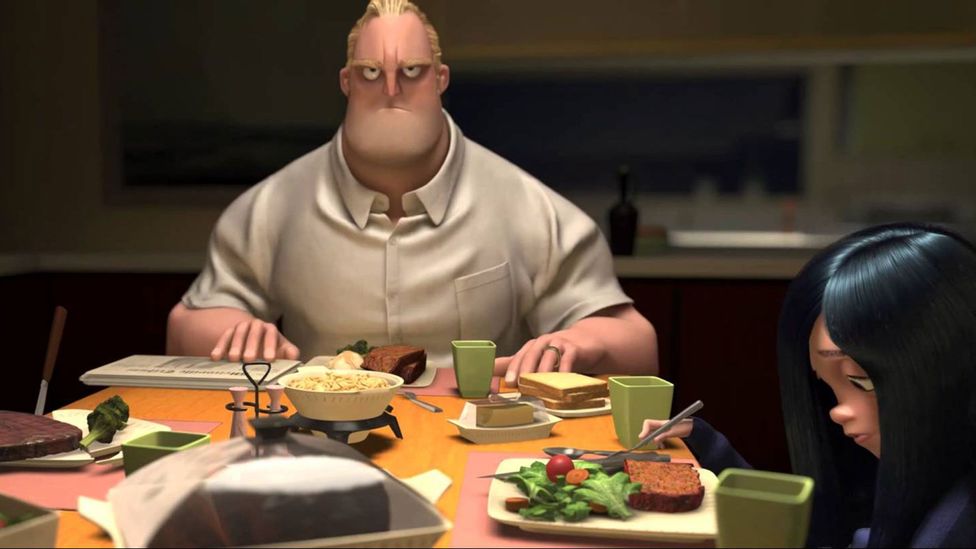
In The Incredibles, Mr Incredible is forced to carelessness his criminal offence-fighting exploits and get an role task (Credit: Disney/Pixar)
The theme is at its most poignant in Toy Story and its two heart-wrenching sequels, but it crops up elsewhere in the company's canon. Finding Nemo is built on the anxieties of Nemo'south begetter, a widower packing his son off to school. In Monsters, Inc., Sulley and Mike are regular Joes who clock into work in a factory every morning, while the child in the movie, Boo, is a problem they accept to deal with. In Upward, Carl Fredricksen is an embittered widower who never managed to get on the earth-trotting adventures that he and his wife ever planned; and he, also, is landed with a small child to wait after.
And in The Incredibles, Mr Incredible is forced to abandon his offense-fighting exploits and get an office job. It says a lot virtually the Pixar mindset that the one character in The Incredibles who has tried to fulfil his childhood dreams is Syndrome, the psychotic villain – and he ends up being sucked into a jet engine. His mistake, equally Buzz could have told him, was thinking that he could fly, whereas the best we can hope for is "falling with fashion".
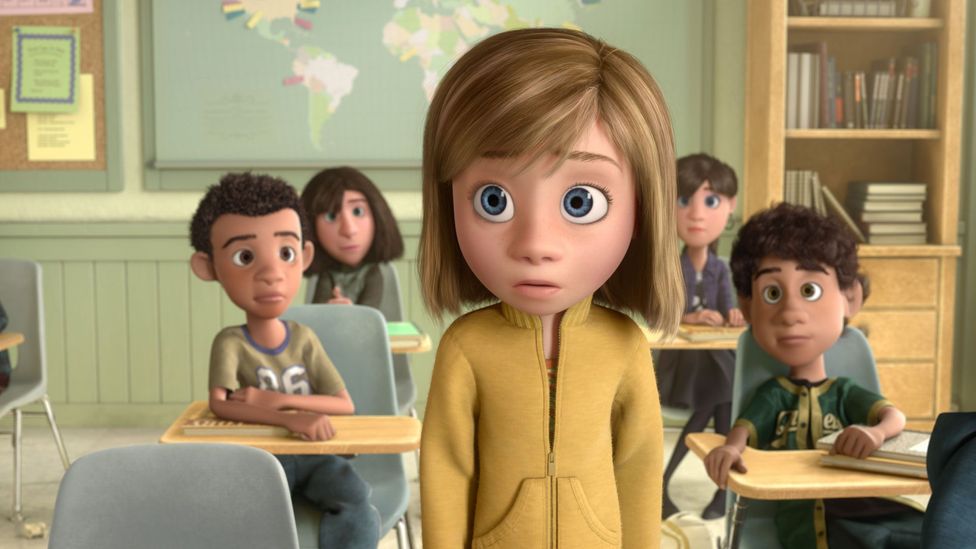
According to Within Out, each of us is ruled past Joy, Sadness, Fear, Acrimony and Disgust (Credit: Disney/Pixar)
Pixar'south imminent release, The Expert Dinosaur, may be its kickoff to plow away from disappointed adults: its hero is a boy, admitting a male child dinosaur. But the company'due south other 2015 picture, Within Out, sticks to its usual perspective. On ane level, Within Out is the coming-of-historic period story of an 11-year-old girl, Riley, who explores the wider world, like Bambi and Pinocchio before her. Merely, unlike Bambi or Pinocchio, Riley herself is pushed into the background.
The characters in the foreground are parental figures again: anthropomorphised emotions who care desperately for an oblivious kid. And what are those emotions? According to Within Out, each of u.s.a. is ruled past 5 dominant feelings, and while one of them is Joy, the other four are Sadness, Fright, Anger and Disgust. Ingmar Bergman, you imagine, might have deemed this take on the human psyche to be a chip on the gloomy side.
All the same, Bergman and any other writer-director would have been proud of the film's ultimate lesson: that anybody is miserable some of the fourth dimension, and that that's OK. That'south what adulthood is all about. Many viewers had tears in their optics when Riley learnt that lesson in Inside Out. Just poor Buzz Lightyear learnt it in Toy Story 20 years ago.
If yous would like to comment on this story or anything else y'all have seen on BBC Culture, head over to our Facebook page or message us on Twitter .
Source: https://www.bbc.com/culture/article/20151120-the-dark-side-of-toy-story
0 Response to "Woody Would Be Fixed Again in"
Post a Comment